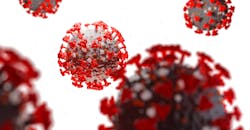The United States may be at the beginning of the feared “second wave” of COVID-19 infections. According to the latest data available from the Johns Hopkins University of Medicine, the U.S. recorded more than 50,000 new cases on June 2, setting another daily record that more than doubles new cases numbers from May. In order to combat alarming statewide resurgences of the virus, Arizona, Texas, Florida and California have all tightened restrictions on businesses that rely on social gatherings: bars, restaurants, and movie theaters.
The increase in positive diagnoses of the virus is not only due to increased testing. According to data reported by the Associated Press, while 40 out of 50 states are seeing increasing numbers of positive tests, 34 of 50 are also seeing higher percentages of tests coming back positive, indicating that the higher number of cases is rising independently of the rise in testing.
Under guidelines released by the White House back in April, states or regions should only consider reopening measures if the number of known COVID-19 cases in their state or region have been falling for two weeks. Only eight states currently report both falling numbers of new cases and falling percentages of positive tests issued over that period: Connecticut, Maryland, Massachusetts, Nebraska, New Jersey, New York, Rhode Island, and Vermont.
A Recovering Economy
The Department of Labor said that the unemployment rate dropped to 11.1% in June, down 2.2 points from May, as the overall economy added 4.8 million nonfarm jobs. The manufacturing sector added 356,000 new jobs, more than two-thirds of which were in durable goods production.
The Bureau of Labor Statistics, which cultivates the report, attributed the increase of new jobs to reopening measures taken in April and May. The report relies on data collected during the first half of June, and leaves out any potential “second wave” impact from recent weeks of skyrocketing infection rates. Read the full story here.
Earlier in the week, the Institute for Supply Management indicated that manufacturing was back on a growth cycle. The Institute’s purchasing manager’s index for manufacturing rose nearly 10 points to 52.6%, indicating growth in the industry. According to Timothy Fiore, CEO of the ISM, the positive results indicate a manufacturing sector recovering at rates unseen since April 1980. Comments by manufacturing CEOs were generally positive, and demand and consumption indexes increased. Read the full story here.
Sustained Relief Efforts
On July 1, the Senate voted to extend the Payroll Protection Program of the Small Business Administration a second time, increasing the amount of time small businesses can apply for a COVID-19-relief loan. The PPP was first established in March with the passage of the CARES Act; in May, Congress voted to extend it through June 30 and adjust some of the conditions necessary for loan forgiveness. The latest extension bill will keep the program operational through August 8. Read the full story here.
Texas GM UAW Requests Production Halt
On July 1, the local UAW chapter of Arlington Assembly plant in the Dallas-Fort Worth area of Texas requested that GM temporarily halt production at their plant as cases of the novel coronavirus in the state spike dramatically. “Due to the most recent data on the COVID-19 outbreak, the Bargaining Committee has asked General Motors to shut down Arlington Assembly until the curve is flattened,” read a statement from the union. Read the full story here.
About the Author
Ryan Secard
Associate Editor
Ryan Secard joined Endeavor B2B in 2020 as a news editor for IndustryWeek. He currently contributes to IW, American Machinist, Foundry Management & Technology, and Plant Services on breaking manufacturing news, new products, plant openings and closures, and labor issues in manufacturing.
